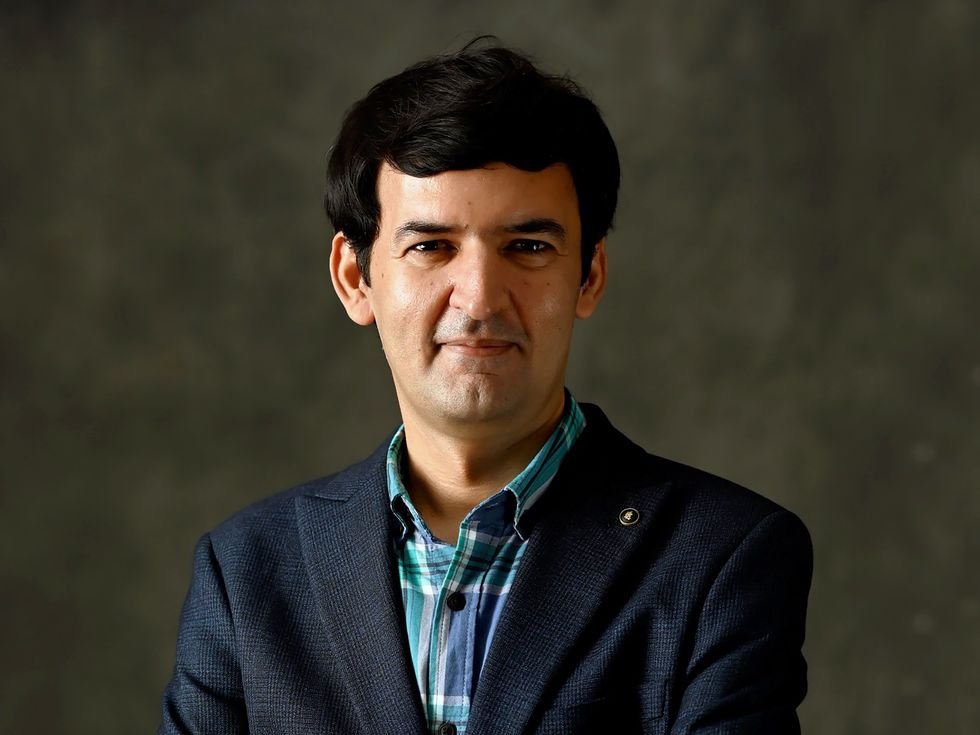
It’s often said that a single moment can spark a lifelong journey. For me the moment happened in 2011, when I was a graduate student—not in a lab or a classroom but rather in a conference hall in Rome. I was presenting my graduate research on a helix antenna for wideband terrestrial and GPS L2 communications at the European Conference on Antennas and Propagation. EUCAP, organized by the European Association on Antennas and Propagation, is supported by IEEE.
Although I attended the conference to receive feedback on my research, I left with something far greater: an introduction to IEEE.
At the time, I didn’t know that the organization would redefine my career, expand my worldview, and plant the seeds of a purpose-driven life in engineering.
I returned home energized, not only to grow in my field but also within IEEE, so I joined as a graduate student member.
Fourteen years later, I now serve as chair of the IEEE Islamabad Section, having walked a journey built on learning, leadership, and the belief that engineering must serve humanity.
Turning a spark into fuel
Upon returning to Pakistan after EUCAP 2011, I realized the immense potential for creating meaningful local impact on the country’s engineers if IEEE’s global energy and resources were effectively harnessed. My background in RF and microwave engineering played a central role in shaping my contributions to IEEE.
While working at the National University of Sciences and Technology (NUST) in Islamabad, I identified a pressing local need that could be addressed using IEEE’s support and resources: The country lacked a centralized platform for microwave and RF-related research, collaboration, and training.
To fill that gap, in 2016 I formed Pakistan’s first joint chapter of the IEEE Antennas and Propagation, Circuits and Systems, Electromagnetic Compatibility, and Microwave Theory and Techniques societies.
The joint chapter offers workshops and technical sessions for academics, students, and young professionals. It also provides opportunities for international collaboration and networking among IEEE members.
More than 200 events have been organized, bringing distinguished professors and researchers to Pakistan as speakers. The visits catalyzed IEEE memorandums of understanding that included student exchange programs and cross-border research.
More importantly, they exposed hundreds of young Pakistani engineers to world-class knowledge. Faculty and students from all over Pakistan are participating and working at facilities they couldn’t previously access, such as anechoic chambers and electromagnetic compatibility labs that are used in antenna and microwave device testing.
Our efforts were recognized in 2019 and 2020 with Best Chapter Awards from the societies that formed the joint chapter.
During the early part of the COVID-19 pandemic, the chapter launched a webinar series on YouTube that showed how to use instruments for the characterization of antenna and microwave circuits.
 Nosherwan Shoaib [middle], Hammad M. Cheema [left], and Muhammad Umar Khan accepted the Best Chapter Award on behalf of the joint chapter of the IEEE Antennas and Propagation, Circuits and Systems, Electromagnetic Compatibility, and Microwave Theory and Techniques societies. Cheema is its vice chair and Khan is its treasurer.Ghulam Rasool
Nosherwan Shoaib [middle], Hammad M. Cheema [left], and Muhammad Umar Khan accepted the Best Chapter Award on behalf of the joint chapter of the IEEE Antennas and Propagation, Circuits and Systems, Electromagnetic Compatibility, and Microwave Theory and Techniques societies. Cheema is its vice chair and Khan is its treasurer.Ghulam Rasool
Supporting IEEE’s mission
I have led several IEEE humanitarian projects that have improved lives in some of Pakistan’s most underserved communities.
One project that left a lasting impact on me was building homes for families displaced from the 2022 floods in the Sindh province. Pakistan that year experienced the deadliest floods the country had ever seen. An estimated 33 million people were affected, and 20 million are still living in dire conditions. The floods damaged houses, hospitals, and electricity and road infrastructure.
With support from the IEEE Humanitarian Technology Board, the IEEE Special Interest Group on Humanitarian Technology, and NUST, IEEE volunteers built 17 homes. They were equipped with solar-powered energy systems that provided electricity for lights, fans, and other basic equipment, ensuring long-term sustainability.
IEEE volunteers also provided vocational training to survivors, equipping them with practical skills in basic electronics and solar installation. Their efforts aimed to restore livelihoods, promote self-reliance, and empower people to launch home-based businesses.
In 2023 I worked with EPICS in IEEE to develop a virtual reality–based therapy platform aimed at supporting behavioral development in children with autism. A team of undergraduate students developed the platform, which uses a VR headset to simulate behavioral and communication therapy scenarios within the metaverse. The platform is still being tested and validated.
Another EPICS in IEEE initiative I led involved designing and deploying a smart fall-detection system for elderly people in assisted-living facilities. The system uses 60-gigahertz radar sensors to monitor posture and alert caregivers in the event of a fall.
Diversity and inclusion in engineering
Promoting diversity and inclusion has been a vital part of my IEEE journey. Thanks to support from the IEEE Women in Circuits and Systems group and the IEEE MTT-S diversity and inclusion ad hoc committee, I have organized initiatives aimed at inspiring women and other underrepresented groups to pursue engineering as a career.
I was chosen as a STEM champion this year in the IEEE TryEngineering program. Champions work to do more STEM outreach and connect future engineers with IEEE resources.
IEEE has been more than a professional network; it has been my launchpad for leadership, my platform for humanitarian impact, and my community of mentors.
I promote STEM education by engaging with preuniversity schools and organizing hands-on activities to spark curiosity and learning. Being a champion has been an enriching experience.
My belief in equitable access to education has been the cornerstone of my STEM outreach efforts. I have led more than 30 workshops in collaboration with 20 local nonprofits, benefiting more than 500 orphans and homeless children. The hands-on sessions covered radar, robotics, wireless communication, and other topics. Together with a team of IEEE student volunteers, we also trained teachers to replicate the activities in schools.
Through my work, I have had the opportunity to instill core ethical values in students living in underserved communities. This role has allowed me to advocate for both technical excellence and moral responsibility—two pillars I believe are essential for building a better future through engineering.
Collaboration is key
A major turning point in my volunteer journey came in 2022 through the IEEE Member and Geographic Activities Volunteer Leadership Training program. The VoLT program is designed to deepen volunteers’ understanding of IEEE’s structure, products, services, and available resources. It also helps participants appreciate their role within local units and the broader organization while preparing them for leadership roles. VoLT participants complete a team project, in which they identify a problem, a need, an opportunity, or an area of improvement within their local organizational unit or the global IEEE. Then they develop a business plan to address the concern.
For me, the program provided clarity, confidence, and community. My team project—an AI-based vestibule for IEEE—was ranked second among the submissions. The program was more than just a training exercise; it was a catalyst for my growth as a structured, strategic, and succession-focused leader.
One of my most recent leadership opportunities was chairing the Towards IEEE Pakistan Council mini-conference in May. The event brought together executive committee members from IEEE sections and subsections across Pakistan to explore the formation of a national IEEE council to unify efforts with global IEEE practices.
I also spearheaded the establishment of the IEEE Islamabad Section life member affinity group and the IEEE Communications Society professional chapter.
I believe the active involvement of senior members is essential—not only for their mentorship and wisdom but also to help the section reach new heights of excellence.
I strongly believe in cross-institutional collaboration—which is why the IEEE Islamabad Section is actively partnering with organizations including the Pakistan Aerospace Council, the Institution of Engineering and Technology, and the Institution of Mechanical Engineers to amplify our impact on the engineering and scientific community. The partnerships will enable joint technical seminars and training workshops that broaden our outreach and strengthen our contributions.
Through international conferences, seminars, joint workshops, and collaborative projects, the IEEE Islamabad Section has engaged with leading electronics companies Rohde and Schwarz of Munich and Keysight Technologies of Everett, Wash., to promote innovation, skills development, and applied research. The collaborations enhance students’ professional readiness and enable industry partners to connect with emerging academic talent and cutting-edge ideas.
A leadership launchpad
What started as a student membership has grown into a purpose-filled career-long journey. IEEE has been more than a professional network; it has been my launchpad for leadership, my platform for humanitarian impact, and my community of mentors. Every conference I organized, every child I taught, every family I supported, and every volunteer I mentored are chapters of my story, which IEEE helped write.
To all young engineers, students, and professionals reading this: IEEE is what you make of it. It can be merely a line on your CV, or it can be a compass that guides your career and character. When you align technical skill with empathy and pair leadership with service, you not only grow, you uplift others as well.
I invite you to join, volunteer, and lead. Somewhere, someone is waiting for a solution only you can create—and IEEE can help you deliver it.
My journey has never been mine alone. It has been a collective effort powered by an extraordinary community. I look forward to continuing the mission together, as we strive to make IEEE not just a professional home but also a platform for lasting impact.

